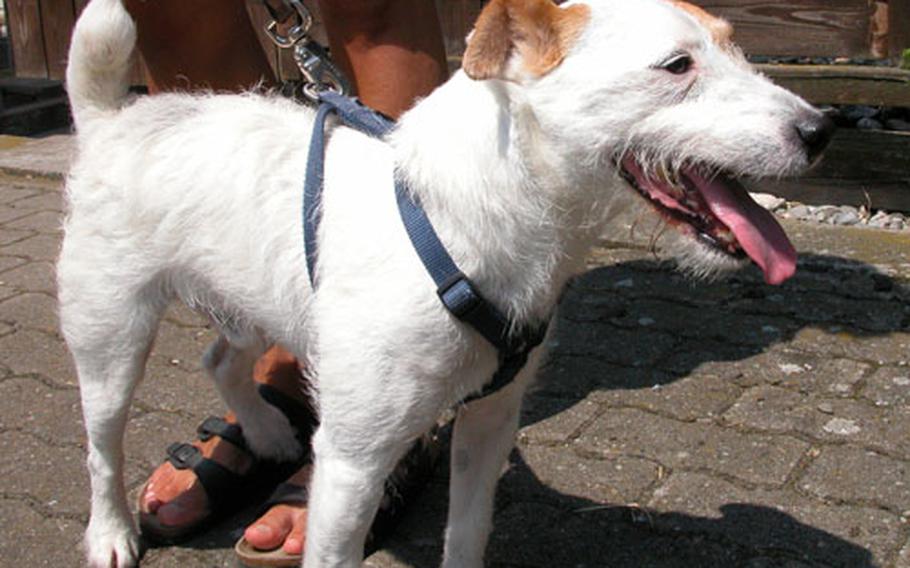
Bogey, who was left behind by a moving Army owner, has been living at the Kitzingen, Germany, animal shelter, known as a Tierheim, for about two months. (Geoff Ziezulewicz / Stars and Stripes)
WüRZBURG, Germany — Sue Zeller is an animal person.
So when the German manager of the Würzburg animal shelter, known as a Tierheim, heard about how a Schweinfurt-based soldier had abandoned a spitz-Pomeranian, she felt she had to adopt it.
The soldier didn’t even stop the car to let the dog out, she said.
“First the dog was thrown out the window and, after this, the kennel,” Zeller said, adding that the owner was not apprehended.
Even as thousands of soldiers and their families leave the Franconia region of Germany this year as part of the Army’s drawdown, the dogs of war remain. So do the cats of war. And a few guinea pigs and rabbits of war.
And while most stories of Americans leaving their pets behind are not as dramatic as how Zeller came to own a little American dog, enough pets have been left behind to strain the resources of Tierheims in Würzburg and Kitzingen, cities with dwindling Army communities where soldiers and families are heading back to the States en masse and bases are being emptied in anticipation of a handover to the Germans later this year.
“That’s a big problem for us, these dogs,” said Angela Drabant, manager of the Kitzingen Tierheim, just down the road from American installations that are closing down. “Right now, the shelter is full.”
It’s not clear exactly what caused all these furry family members to be left behind, but cost or the added burden of setting up a pet shipment are mentioned as possible reasons.
Some airlines charge by the weight of the animal, while others charge by the size of the animal’s kennel. United Airlines, for example, would charge $127 for a small kennel to be sent from Frankfurt to Kansas. A large kennel would cost $442 for the same trip.
“I’m a little baffled about it,” said Kelly Williams, a plans and operations official for U.S. Army Garrison Franconia. “It seems to be that people are seeing it’s too much trouble to try and take them back.”
Unlike many animal shelters in the States, German law prohibits homeless pets from being put to sleep, so the animals sit at the Tierheim until a home is found for them.
“If they come, then we take them,” Drabant said.
So far this year, about 40 percent of the 51 dogs the Kitzingen Tierheim received were from Americans, Drabant said. For all of last year, American dog drop-offs constituted only about 11 percent. The percentage of American cats and other pets making a temporary home at the Tierheim is also up, she said.
The Würzburg Tierheim also has seen a tight squeeze in terms of space and money. The shelter has received about 10 dogs from Americans since May, Zeller said. Usually, they receive about one American dog a month.
“Ten dogs is not small,” Zeller noted. “Most of all, it’s space. We have enough German dogs.”
Compounding the problem, active-duty soldiers are not allowed to adopt from the Tierheims because of their transient status and concerns that they’ll just bring them back at the end of their tour.
“The Americans come here and buy pets, even if they know they would go in a few years,” Zeller said, explaining the ban. “We know most of the Americans are here for three years.”
Housing American pets while their owners were on vacation was also an income source that has dried up with the American departures, Drabant said. Americans constituted about one-half of the business for housing pets whose owners were temporarily away.
“They are gone,” she said. “And that’s a financial problem.”
Tierheims receive small percentages of their operating budget from area cities and villages, and rely on adoption fees and other cash-flow sources to stay in the black. Soldiers still in the area have been donating food to the Tierheims, and that has helped a lot, Zeller said. One soldier donated more than 500 pounds of pet food and supplies to the Würzburg shelter, and donation boxes for the Tierheims sit at the post exchange on Würzburg’s Leighton Barracks.
To try and counter the abandonment concerns, garrison commander Col. Russel Santala urged pet owners in a May issue of the garrison newspaper to do the “right thing” and give their pets to the Tierheims.
Unwanted pets need to be taken care of in a humane way, Williams said.
“Pets are family,” he said. “Unfortunately, everything doesn’t work out the way we would like. Instead of people driving their pet to the German countryside 15 to 29 kilometers away and leaving them, the pet can be sheltered and fed by the Tierheim.”